Search
 News
News
Tailored Deep Brain Stimulation Improves Walking in Parkinson’s Disease
UCSF researchers develop first-of-its-kind measure of gait performance, allowing researchers to fine tune electrical pulses to the neural network. Document
Document
UCSF Stroke Clinic
The stroke clinic provides expert consultations and outpatient care to patients who are at risk of a stroke or have had a stroke due to neurovascular conditions. News
News
This AI Tool Helps Neurosurgeons Find Sneaky Cancer Cells
An AI-based diagnostic system reveals cancerous tissue that may not otherwise be visible during brain tumor surgery. Document
Document
Neuromuscular Clinic Referral Guide
 News
News
New Discovery Reveals Pathway to Modulate Scarring in Spinal Cord Injury
After a spinal cord injury, nearby cells quickly rush to action, forming protective scar tissue around the damaged area to stabilize and protect it News
News
Forecasting May Help People with Epilepsy Predict Their Seizures
UCSF team discovers brain activity patterns that foreshadow seizures up to 24 hours before they occur. News
News
ER Visit Leads to Moyamoya Disease Diagnosis and Personalized Treatment Plan: UCSF Case Study
A 47-year-old woman came to the UCSF emergency department with acute slurred speech along with left-sided facial droop and left-sided numbness, suggesting a stroke. Vessel imaging showed bilateral obstructive arteriopathy, an indication of moyamoya disease. News
News
Improving Measurement of Parkinson’s Disease Severity with AI
Despite recent advancements in the treatment of Parkinson’s Disease, it remains a challenge to accurately measure the progression of symptoms in this neurological disorder. Document
Document
Interdisciplinary Vasculopathy Care
The UCSF Vasculopathy Clinic provides comprehensive, interdisciplinary care for patients with moyamoya disease, atherosclerosis and other conditions that cause intracranial vasculopathy.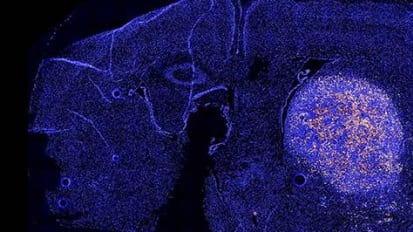 News
News
Gene Therapy Is Halting Cancer. Can It Work Against Brain Tumors?
Approximately 12,000 Americans are diagnosed each year with glioblastoma. Patients survive on average for just 15 months after their diagnosis, and new treatments are urgently needed. News
News
Focused Ultrasound Technology May Overcome Barrier to Brain Tumor Treatments
The blood-brain barrier protects the brain from many viruses, bacteria, and other harmful small molecules that could be circulating throughout the body. However, this same barrier prevents many cancer therapies from reaching brain tumors. Document
Document
Neuroendovascular Surgery
The newly formed Neuroendovascular Surgery program at UCSF offers accessible, coordinated care for even the most complex vascular disorders of the central nervous system. News
News
Focused Ultrasound Stops Tremors in Patients with Movement Disorders: UCSF Case Studies
High-intensity focused ultrasound (HIFU) is an incision-free, minimally invasive outpatient procedure during which MRI-guided ultrasound is directed at the ventral intermediate (VIM) nucleus of the thalamus. News
News
Scientists Discover a Deadly Brain Cancer’s Hidden Weakness
The difficult-to-treat brain cancer glioblastoma steals a person’s mental faculties as it spreads, yet the tumor’s insidious ability to infiltrate distant networks in the brain could also prove its undoing. Document
Document
Center for Encephalitis and Meningitis
The UCSF Center for Encephalitis and Meningitis provides comprehensive services to diagnose and treat patients with challenging neuroinflammatory disorders.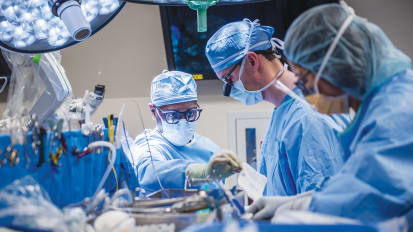 News
News
Minimally Invasive LITT Effective for Recurrent Glioblastoma: A UCSF Case Study
A 65-year-old woman with a small focal recurrence of glioblastoma was treated with laser interstitial thermal therapy (LITT) at UCSF nearly five years after her first tumor resection surgery. News
News
Drug Targeting Tauopathies in Mice Reveals Sex Differences in Response
Microglia are cells that are central to both brain health as well as disease progression in many neurological conditions. Document
Document
UCSF Laser Interstitial Thermal Therapy
UCSF Laser Interstitial Thermal Therapy News
News
Aggressive Surgery Increases Survival with Low-Grade Brain Tumors
UCSF-Led study shows extensive resection results in longer survival for glioma patients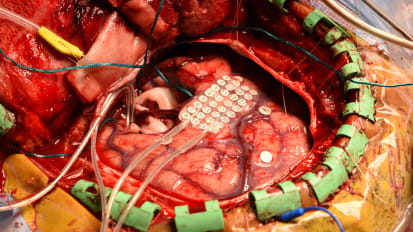 News
News
Cerebral Cavernous Malformation Treatments Relieve Disparate Symptoms
Two patients with severe yet different neurological symptoms were referred to UCSF for emergent neurosurgical evaluation. Both were found to have previously undiagnosed cerebral cavernous malformations (CCMs), but each patient’s treatment was unique. News
News
First “Neuroprosthesis” Expands Vocabulary and Mobility for Man With Paralysis in New Milestone
The first “neuroprosthesis,” developed by UCSF researchers in 2021, translates brain signals from a man with severe paralysis directly into words that appear as text on a screen. Using this brain-machine interface, he can also move a robotic arm to manipulate objects.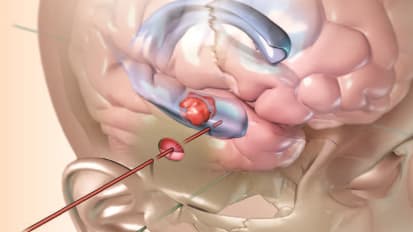 Document
Document
Cerebrovascular Neurosurgery
As one of the highest volume and most experienced surgical programs in the nation for cerebrovascular disorders, we offer a wide range of treatment options tailored to each patient, leading to safer surgeries and better outcomes.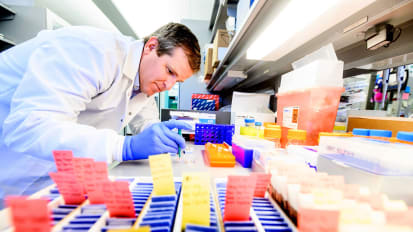 News
News
Genomic Sequencing Is Changing Diagnosis, Treatment for Patients with Brain Cancer
Patients diagnosed with a type of brain tumor survived for longer when they were treated aggressively with surgery, radiation and chemotherapy. News
News
Seizures Stopped, Speech Preserved After Rare Auditory Cortex Tumor is Removed: A UCSF Case Study
The extraordinary success was made possible through research on the neural mechanisms of speech by Edward Chang, MD, UCSF neurosurgeon and chair of the Department of Neurological Surgery, and an advanced phase 2 surgical evaluation by the UCSF Epilepsy Center team.

